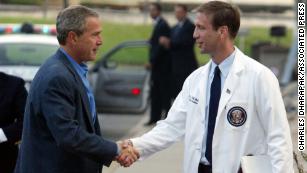 जैसा इस आलेख के 'शीर्षक' से ज़ाहिर है -एक किताब का नाम है यह जिसकी लेखिका डॉ बैंडी एक्स ली है। आप येल में कार्यरत एक मनोरोगविद हैं। अलावा इसके जन- बैठकों को खबरदार करना चेतावनी देना आपका कर्म (धर्म )है।आप ऐसे आयोजनों की व्यवस्थापक हैं।
जैसा इस आलेख के 'शीर्षक' से ज़ाहिर है -एक किताब का नाम है यह जिसकी लेखिका डॉ बैंडी एक्स ली है। आप येल में कार्यरत एक मनोरोगविद हैं। अलावा इसके जन- बैठकों को खबरदार करना चेतावनी देना आपका कर्म (धर्म )है।आप ऐसे आयोजनों की व्यवस्थापक हैं। Dr.Bandy X Lee is the organizer of the Duty to Warn conference and has written a book, "The Dangerous Case of Donald Trump."
आपने कांग्रेस की एक ऐसी बैठक को सम्बोधित करते हुए जिसमें अधिकतर डेमोक्रेटिक मेंबर थे दिसंबर २०१७ में एक नै लेकिन चौंकाने वाली शब्दवाली का प्रयोग किया - डैंजरसनेस। एक तरह से मेडिकलाइज़्ड ही कर दिया आपने इस शब्दावली को।
बताते चलें -J. C. Segens द्वारा लिखी हुई डिक्शनरी आफ मॉडर्न मेडिसिन के अनुसार dangerousness का अर्थ वह मानसिक अवस्था है जिसमें आप खतरनाक साबित हो सकते हैं -दूसरों को संभवतया भौतिक और मानसिक नुक्सान भी पहुंचा सकते हैं।
उनका यह अनर्गल प्रलाप ट्रम्प साहब की ट्वीट्स और भैंट-वार्ताओं ,चंद पब्लिक रिकार्ड्स ,वीडियो टेप्स ,ट्रम्प साहब की चंद पब्लिक स्पीचेस पर आधारित है। कोई आर्म चेअर क्लिनिकल साइक्लोजिस्ट ही इस प्रकार की टिप्पणी करेगा।
मनोरोग विदों के अमरीकी संघ(अमेरिकन साइकिएट्रिक एशोशिएशन ) ने उन्हें इस बात पर फटकार भी लगायी है उन्हें चेताया है यह कहकर के यह १९७३ से लागू उस नीति एवं चिकित्सा -नैतिक -शास्त्र सम्बन्धी क़ानून का उल्लंघन है जिसे गोल्ड वाटर रूल १९७३ कहा जाता है।इसके तहत जब तक आपने स्वयं किसी व्यक्ति का इलाज़ नहीं किया है और आपको उसके बारे में खासकर उसके मानसिक रोग के बारे में अन्यों को सूचना देने के लिए अधिकृत नहीं किया जाता है आप ऐसा नहीं करेंगे।
मज़ेदार बात यह है ट्रम्प साहब सिर्फ 'ली' क्या किसी के भी मनोरोगी (साइकिएट्रिक पेशेंट )नहीं रहे हैं।
ली १९७६ में लागू उस व्यावसायिक निर्देशिका ,आचार संहिता की दुहाई देती हैं आड़ लेती हैं जिसे तरासॉफ रूल (Tarasoff Rule 1976 )१९७६ कहा जाता है। इस विवादास्पद अनुदेशिका के अनुसार यदि किसी मनोरोगों के माहिर को ऐसा लगता है के उसका मरीज़ अन्यों के लिए खतरा पैदा कर सकता है तब उसका यह दायित्व है वह उन अन्यों को खबरदार करे।
गौर करने वाली बात यह है यहां पर 'रोगी' ट्रम्प को बतलाया जा रहा है और 'विक्टिम्स' उन सात अरब पचास करोड़ से ज्यादा लोगों को बतलाया जा रहा है जो दुनिया भर में कहीं भी रहते हैं।
लगता है ली अभी वहीँ खड़ीं हैं जहां अमरीकी समाज १९७२ में खड़ा था जब डेमोक्रेटिक पार्टी के उपराष्ट्रपति पद के लिए मनोनीत उम्मीदवार को इस बिना पे हटा दिया गया था के वह अवसाद ग्रस्त रहें हैं।
१७७६ से १९७४ तक की अवधि में कार्यरत रहे अमरीकी राष्ट्रपतियों में से तकरीबन -तकरीबन आधी संख्या में उम्र के किसी न किसी सौपान में मनोरोग सम्बन्धी नैदानिक साक्ष्य मौजूद रहें हैं। इन आधों के आधों में ऐसे लक्षण तब भी मौजूद थे जब वह कार्यरत थे।
इनमें से भी आधे अवसाद की चपेट में आये थे। अब्राहम लिंकन तो मनोविक्षिप्ति (साइकोसिस )की चपेट में आ गए थे। इनका भी पांचवां हिस्सा बाइपोलर इलनेस से ग्रस्त रहा है।शेष पांचवां हिस्सा शराब का लती रहा है। इसीलिए यह व्यवस्था रखी जाती थी के वह कोई महत्वपूर्ण निर्णय शाम को न लें तब जब वह सुरूर में आ जाते थे। (स्रोत: जर्नल आफ नर्वस एन्ड मेन्टल डिजीज,२००६ ).
२०१२ में एक अन्य अध्ययन में इस बात का खुलासा हुआ था के जॉन ऍफ़ केनेडी साइकोपैथ (मनोविकृत रोग ग्रस्त -मनोविकृति )यानी ऐसे गंभीर रोग से ग्रस्त थे जो अपने तथा अन्यों के साथ हिंसात्मक व्यवहार कर सकता है.लेकिन साथ ही ऐसा व्यक्ति अपनी निश्चयात्मक बुद्धि ,अपने पक्ष के समर्थन में संलग्नता ,हठीलापन और सामाजिक सेटिंग और व्यवहार में बेहद कामयाब माना जाता है।निर्भय होकर औत्सुक्य शून्य रहते हुए जोखिम उठाने की उस में अपार क्षमता रहती है। वह अपने निःशंक प्रभुत्व पर कायम रहता है। यह व्यक्तित्व का अन्यतम गुण माना गया है।
यहां ये सारी रामकथा सुनाने का मकसद यह बताना है के भाई ट्रम्प में लाख दोष रहें हों भले वह बड़बोले रहे हों आप उनकी आड़ में तमाम मनोरोगियों की अवमानना कर रहे हैं अपने अनजाने में ही।
एक 'मधुमेह' या दिल की बीमारी या फिर कार्डियोवैस्कुलर डिजीज यानी हृदय एवं रक्तसंचरण समबन्धी हृदय रोग को भी पुख्ता करने के लिए अनेक परीक्षण न सिर्फ किये जाते हैं उन्हें आवधिक तौर पर दोहराया भी जाता है रिकार्ड रखा जाता है -तब जाकर रोगनिदान पुख्ता किया जाता है।
मनोरोगों का पता लगाना कोई आसान काम नहीं है। कई मर्तबा तो यह एक व्यवहार मात्र समझा गया है जैसे शिजोफ्रेनिक बिहेवियर। बला के जीनियस रहे हैं ऐसे लोग। बाइपोलर इलनेस के मरीज़ों ने अलग कीर्तिमान स्थापित किये हैं। आत्मविमोही -ऑटिज़्म -आटिस्टिक बिहेवियर की चपेट में आये बालकों में अतिरिक्त प्रतिभा होती है ये हायर मेथ्स कर लेते हैं।यह व्यक्ति का दुर्गुण नहीं है। सरकारी नौकरियों में आने के बाद व्यक्ति का आम कायिक मेडिकल चेकप होता है। बस।मनोरोगों के लिए परीक्षण इसीलिए नहीं होता है क्योंकि इनके होने न होने की पुष्टि करना खालाजी का घर नहीं हैं ली महोदया।
यहां मैं अपने व्यक्तिगत अनुभव का उल्लेख करना चाहूंगा। मैं ऐसे निकटतर संबंध के साथ गत २८ -२९ बरस से हूँ जो मनोविकारों से ग्रस्त रहा है। नए क्षितिज तराशे हैं इस महिला ने बस मैंने खुली छूट दी जो मरजी काम कारो ,जहां जैसे दिल करे रहो कोई बंदिश नहीं। रोगनिदान पहले कहा गया -ऑब्सेसिव कम्पलसिव डिसऑर्डर फिर शिज़ोफ्रेनिक बिहेवियर और आखिर में बाइपोलर इलनेस। एक मर्तबा इंडिआ हेबिटाट सेंटर में एक विस्तारित व्याख्यान और उसके बाद खुली चर्चा में मैंने इस रोग निदान की अनिश्चितता पर सवाल उठाया था -बेहतरीन ज़वाब दिया था पेनलिस्ट ने -कहा साइकिएट्री इस पर शर्मिन्दा नहीं है वह अपनी तरफ से अच्छा ही करती है।
साथ ही एक बात और कहता चलूँ -कोई दर्जन दो भर दवाएं हैं इनके ही कोम्बोज़ हैं जिन्हें दिमागी जैव -रसायनों को पुनर्संतुलित करने के लिए आज़माया जाता है। लाभ मिलता है अलबत्ता दवा धर्मनिष्ठ होकर खानी पड़ती है। कायिक रोगों में भी तो इससे भिन्न नहीं है। लक्षणों का ही इलाज़ और शमन होता है। कई जीवन शैली रोगों में उम्र भर दवा लो। कैंसर समूह के रोग पूरी काया के रोग हैं कैंसर शरीर के एक से दूसरे भाग में चला आता है। एक स्तन की तराशी कर दो दूसरे में आ जाएगा।
मनोरोगों को इतना बड़ा अजूबा ये महबूबाएं क्यों बना रही हैं ?
मनोरोगों का वैसे ही प्रबंधन होता है जैसे किसी अन्य कायिक रोग का। इसे आज भी एक सोशल स्टिग्मा मानना नादानी है नासमझी है वाहियात बात है।
मनोरोगों की तो अब टैगिंग भी लेवलिंग भी नहीं की जाती है। कायिक रोगों की तरह ही लक्षणों पर आधारित इलाज़ चलता है।कोई सीटी स्कैन ,एमआरआई दिमाग में मौजूद चंद जैव - रसायनों (न्यूरो - ट्रांस्मीटर्स )के कम रह जाने या ज्यादा हो जाने की इत्तला नहीं दे सकता।
अल्ज़ाइमर्स के बारे में इत्तला भी मरीज़ रहे शव के दिमाग की गहन पड़ताल के बाद ही पुख्ता हो पाती है।
डिमेंशिया से ग्रस्त व्यक्ति सामान्य व्यवहार नहीं कर पाता है याद रखना ,सोचना उसके लिए मुश्किल हो जाता है।यह मस्तिष्क रोग या दिमागी आघात ,दिमागी चोट से उत्पन्न एक स्थिति हो सकती है। अल्ज़ाइमर्स में दिमागी न्यूरॉन्स के विनष्ट होते चले जाने के बाद मस्तिष्क ही सिकुड़ता चला जाता है। एम्लोयड प्रोटीन प्लाक्स बनते चले जाते हैं। इसके परीक्षण का कोई तरीका आपके पास नहीं है।कोई ब्लड टेस्ट आपके पास नहीं है। यही बाद में डिमेंशिया की भी वजह बन जाता है। काहे ट्रम्प के पीछे पड़े हुए हैं लोग ?
चंद दिमागी जैवरसायनों की घट- बढ़ का नतीजा होते हैं मनोरोग-गत व्यवहार। दवाओं से उस घट बढ़ का प्रबंधन कर लिया जाता है। नियमनिष्टता यहां भी काम आती है कायिक रोगों की तरह। अलावा इसके यहां एक मनोरोगविद अपनी तथा साथी क्लिनिजकल साइकोलॉजिस्ट की मदद के अलावा मरीज़ से सम्बंधित लोगों से ज्यादा से ज्यादा जानकारी जुटाता रहता है। पूरा भरोसा नहीं होता तब भी उसको रोगनिदान का अपनी तरफ से अलबत्ता वह कोई कसर भी नहीं छोड़ता है।
'ली' रिमोट कंट्रोल से ही रोगनिदान कर रहीं हैं। ड्राइंग में टीवी देखकर। यह क्या मज़ाक है खुद अपने साथ ही जो वह कर रहीं हैं ?कोई तो हमने बतलाये।
कुछ लोग ट्रम्प साहब को आत्मश्लाघा आत्मरति से ग्रस्त बतला रहे हैं। नार्सिसिस्ट कह रहे हैं। Narcissism से ग्रस्त कह रहे हैं। भाईसाहब आप में से कौन आइने के सामने नहीं खड़ा होता कौन अपने पे नहीं रीझता है ? है कोई माई का लाल ?
अमरीकी साइकॉनेलिटिक एशोशिएशन और अमेरिकन साइकिएट्रिक एशोशिएशन भी परस्पर ट्रम्प साहब को लेकर एक राय नहीं हैं।कुछ गोल्ड रूल के तरफ़दार कुछ तरसोफ्फ १९७६ (Tarasoff 1976 rule )के। आप किधर हैं अपनी राय दो टूक लिखें।टिपण्णी करें।
सन्दर्भ -सामिग्री :http://www.cnn.com/2018/01/12/health/presidential-mental-health-gupta/index.html
मूल आलेख आप अंग्रेजी में भी पढ़ सकते हैं :
The discussion around the health of President Trump has reached a new level of urgency this week because he will be an outpatient at Walter Reed Medical Center today, undergoing a battery of tests to determine whether he is "fit to lead," a colloquial term many use but with little clinical basis.
Almost everywhere I go, including the hospital where I practice, nearly everyone wants to weigh in about the mental health of Trump, and perhaps because I am a neuroscientist and medical reporter, I have become a repository of these opinions (though I will tell you the mind is a much more difficult thing to probe than the brain).
Some of the opinions have been cringeworthy, like the time a fellow physician asked whether I thought the president was "crazy" in a crowded elevator full of patients, any one of whom could be suffering from debilitating mental illness. Many of the armchair diagnoses have been misguided, even if well-intentioned, and all have been thus far unsubstantiated.
Particularly bothersome is the commingling of the president's questionable behavioral traits with serious mental illness. It is, as Dr. Allen Frances, the chairman of the DSM-IV task force that defines the criteria of various mental conditions, said, an insult to the mentally ill.
The point is, there can be major pitfalls with these sorts of distant diagnoses.
For starters, they are typically wrong.
An accurate diagnosis of mental illness is a serious and laborious undertaking. Many patients see at least three mental health care professionals over several months to arrive at any diagnosis.
Even after sustained contact with a patient, most responsible psychiatrists will follow up with family members and close acquaintances to gather as much information as possible. They want to be as certain as possible, as any doctor would be with the diagnosis of, say, cancer or a stroke. Unlike those diseases, though, mental illness has no particular brain image or blood test that can easily make the case. It takes time and expertise by someone who has been trained to find the clues and avoid the traps -- and that excludes the vast majority of us, including me.
Trump's 'diagnosis'
Frances doesn't believe that Trump has narcissistic personality disorder, a popular amateur diagnosis on the internet. This is particularly important because Frances also happens to be the Duke University professor who wrote the criteria defining the disorder.
I have often responded to those sharing their opinions with a smile and a shrug when approached by people wanting to have the "Trump is crazy" discussion. It is not out of lack of interest but because, after the umpteenth time, I know that the discussion often sadly leads to worsening misconceptions about the mentally ill.
Point is, even if Trump was diagnosed with a mental illness, that is not necessarily a barrier to holding a job or even higher office. It was in 1972 when Thomas Eagleton was dropped as a Democratic vice presidential candidate after it was revealed that he had been hospitalized for depression. We seem hardly enlightened since then.
Fully half of US presidents between 1776 and 1974 had clinical evidence of mental illness during their lifetimes (half of them while in office), according to a 2006 study in the Journal of Nervous and Mental Disease. Half of those were depressed, including James Madison, Dwight Eisenhower and, perhaps most famously, Abraham Lincoln, who also suffered from psychosis. Lyndon Johnson, Theodore Roosevelt and John Adams were among the fifth of US presidents with bipolar disorder. And another fifth were alcoholics, including Richard Nixon, whose staff, according to an NPR interview with one of the study's authors, had to make sure he didn't make important decisions in the evening.
A separate study in the Journal of Personality and Social Psychology from 2012 took it a step further when it concluded that John Kennedy was a psychopath but added that "certain features of psychopathy are tied to successful interpersonal behavior." In particular, it was the trait of "fearless dominance" -- a brashness accompanied by a compulsion to dominate social situations, a higher willingness to take risks and an immunity to anxiety -- that was "associated with better presidential performance, leadership, persuasiveness and crisis management," according to the study authors.
Fearless dominance. When you consider the qualities of a good leader, trust, intellect, curiosity, empathy and discipline probably come to mind, but "fearless dominance" is a frightening term these experts think should be added to the list.
Terms matter when we talk about mental health.
When Dr. Bandy X. Lee, a Yale psychiatrist, briefed mostly Democratic members of Congress in early December, she raised a different term: "dangerousness."
It is not a true psychiatric diagnosis but one that has been medicalized nonetheless. According to J.C. Segens' "Dictionary of Modern Medicine," it is "the state of being dangerous and possibly causing mental or physical harm to others."
Based on "public records, tape recordings, video tapes and his own public speeches, interviews and 'tweets,' " Lee told congressional members, it is "obvious" Trump meets the criteria for dangerousness. And she feels compelled to inform the public. She is the organizer of the Duty to Warn conference and has written a book, "The Dangerous Case of Donald Trump."
That makes many of her colleagues uncomfortable, because they abide by the 1973 Goldwater Rule, which prohibits psychiatrists from opining about the mental health of an individual they have not personally examined. Lee, and a handful of other psychiatrists, instead seem to take cover under a separate professional guideline, the controversial Tarasoff Rule of 1976, which obligates psychiatrists to notify potential victims if they believe their patient is a real threat. It is that "duty to warn," Lee told me over the phone, that has motivated her to break from the rank-and-file psychiatrists.
In this case, she is claiming that the patient is Trump and the potential victims are everyone else on the planet.
Of course, Trump is not Lee's patient, and she has never examined him.
For its part, the American Psychiatric Association offered a rebuke to Lee and others who continue to diagnose from afar. "A proper psychiatric evaluation requires more than a review of television appearances, tweets and public comments. Psychiatrists are medical doctors; evaluating mental illness is no less thorough than diagnosing diabetes or heart disease," it said in a statement this week.
What presidents are tested for
When Trump is examined today for his annual physical, he will undergo a battery of tests. There's no guarantee which ones they will be and no requirement that results be released.
Most presidents have released one- to two-page summaries including height and weight, blood lipid levels and even running speed. George W. Bush, we were told, smoked occasional cigars and ran 3 miles 4 times a week. Only candidate John McCain released his full medical records in 2008, and he invited me to review them in a secure room for a few hours. While McCain's records included detailed reports around his mental health, virtually none of the others I have seen in the past 16 years of reporting on presidential health made mention of the cognitive or mental health of the presidential patient. The current White House has telegraphed that mental health testing is probably not something the president will even undergo.
If his doctors want to probe the brain and mind of Trump and he agrees, a few useful tests could be performed.
The Mini-Mental State Examination is a five- to 10-minute validated exam that has been around since 1975. It consists of 11 questions that focus on five specific areas of cognitive function: orientation, registration, attention and calculation, recall, and language. A low enough score could indicate that the patient is cognitively impaired.
A neuropsychiatric evaluation is much more thorough: up to eight hours, with many cognitive-based questions. The goal is to investigate any changes in the brain that might impact behavior. It can also help identify the early stages of dementia and make clear if a patient is able to conduct the normal activities of daily living.
And although a brain scan, such as a CT or an MRI, would not be able to diagnose a mental illness, it would probably uncover an organic problem such as a tumor, hydrocephalus or types of dementia including vascular or frontotemporal dementia, which in certain locations can greatly impact the behavior, memory and judgment of a patient.
Lee believes Trump should also have a capacity exam, by force if necessary. Capacity, a medical term, is mostly synonymous with the legal term competence. A capacity exam is not precisely defined, but it is one of the most common reasons a doctor like me, a neurosurgeon, will consult with a psychiatrist: I want help in determining whether a patient has the ability to provide consent for an operation.
The question I am typically trying to answer: Can the patient make an informed decision about having surgery? The question Lee is hoping to answer: Can the president make informed decisions about the welfare of the population?
At no other time in US history has a group of mental health professionals been so collectively concerned about a sitting president's dangerousness, according to Lee.





कोई टिप्पणी नहीं:
एक टिप्पणी भेजें